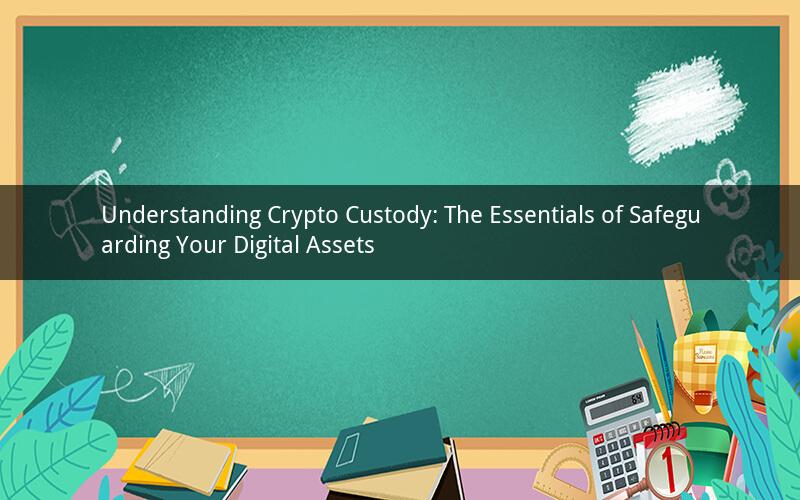
In the rapidly evolving world of cryptocurrency, the concept of custody has become increasingly important. As more individuals and institutions delve into the digital currency space, ensuring the safekeeping of their assets has become a priority. But what exactly is crypto custody, and why is it crucial for the security of your digital wealth? This article delves into the essence of crypto custody, its significance, and the best practices to protect your assets.
The Essence of Crypto Custody
At its core, crypto custody refers to the safeguarding of cryptocurrency assets. It involves storing, managing, and securing digital currencies, such as Bitcoin, Ethereum, and others, to prevent unauthorized access, theft, or loss. Custody solutions can be broadly categorized into two types: cold storage and hot storage.
Cold Storage: The Safe Haven
Cold storage is considered the gold standard in crypto custody. It involves keeping your digital assets in offline wallets, such as hardware wallets, paper wallets, or multi-signature wallets. These wallets are not connected to the internet, which makes them less susceptible to cyber-attacks and hacking attempts.
Hardware wallets are physical devices that store your private keys, providing an extra layer of security. Paper wallets, on the other hand, are paper-based storage solutions that generate public and private keys for you to write down and store offline. Multi-signature wallets require multiple private keys to authorize transactions, further enhancing security.
Hot Storage: The Convenience Trade-off
Hot storage, in contrast, refers to keeping your digital assets in online wallets or exchanges. While this option offers convenience and ease of access, it also comes with increased risk. Online wallets are more susceptible to hacking, phishing, and other cyber threats. However, with the right security measures in place, hot storage can still be a viable option for some users.
Significance of Crypto Custody
Ensuring the safekeeping of your cryptocurrency assets is vital for several reasons:
1. Protection against theft: Crypto custody solutions help prevent unauthorized access to your digital assets, reducing the risk of theft.
2. Compliance with regulations: As the crypto industry grows, regulatory bodies are imposing stricter rules on asset protection. Proper custody practices help you comply with these regulations.
3. Trust and credibility: Demonstrating robust custody practices can enhance the trust and credibility of your organization or business in the crypto space.
4. Asset recovery: In case of loss or theft, proper custody solutions can help you recover your digital assets.
Best Practices for Crypto Custody
To ensure the security of your cryptocurrency assets, here are some best practices to consider:
1. Use a combination of cold and hot storage: A well-balanced approach that utilizes both cold and hot storage can provide the best of both worlds, offering security and convenience.
2. Secure your private keys: Keep your private keys safe and ensure that only authorized individuals have access to them.
3. Regularly backup your assets: Regularly backup your digital assets in case of hardware failure or other unforeseen events.
4. Use multi-factor authentication (MFA): Enable MFA for all your crypto-related accounts to add an extra layer of security.
5. Stay informed: Keep yourself updated on the latest security threats and best practices in the crypto space.
Frequently Asked Questions
Q1: What is the main difference between cold storage and hot storage?
A1: Cold storage involves keeping your digital assets offline, while hot storage keeps them online. Cold storage is more secure but offers limited access, while hot storage is more accessible but comes with higher security risks.
Q2: Can I keep my entire cryptocurrency portfolio in a single hardware wallet?
A2: It is not recommended to keep your entire portfolio in a single hardware wallet, as this can increase the risk of losing all your assets in case of hardware failure or theft.
Q3: Is it safe to use a crypto exchange for storing my assets?
A3: While exchanges offer convenience, they are not as secure as cold storage solutions. It is advisable to keep a significant portion of your assets in a secure offline wallet.
Q4: Can I recover my digital assets if they are lost or stolen?
A4: If you have used proper custody practices and have backups of your private keys, it is possible to recover your digital assets. However, the process can be complex and may require the assistance of a professional.
Q5: Are crypto custody solutions regulated?
A5: Yes, some countries have started regulating crypto custody solutions to ensure the security and compliance of these services. However, the regulatory landscape is still evolving, and it is important to stay informed about the rules in your jurisdiction.